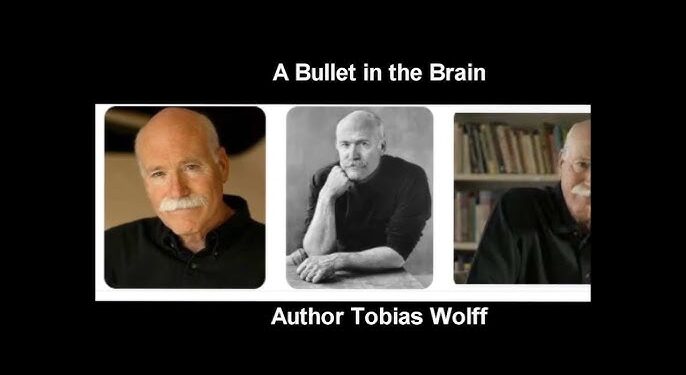Bullet In The Brain Summary & Themes By Tobias Wolff Bullet in the Brain is a short story written by Tobias Wolff, first published in The New Yorker in 1995. Wolff is known for his exploration of human psychology, moral ambiguity, and moments of profound self-realization, and this story exemplifies those themes.
The narrative revolves around Anders, a cynical, sarcastic book critic in his 50s, who experiences a pivotal moment of reckoning in the final moments of his life. The story’s title, Bullet in the Brain, refers to the literal bullet that kills the protagonist, but it also alludes to the way Anders’ worldview, shaped by years of scorn and mockery, is suddenly changed by a brief, unexpected memory that surfaces in his final moments.
Bullet In The Brain Summary & Themes By Tobias Wolff story delves into themes of identity, human vulnerability, and the consequences of a life filled with bitterness. The story also explores the way seemingly trivial moments can shift our perceptions of life and death, and how our memories, particularly those from childhood, can have lasting power.
Plot Summary of Bullet in the Brain
The story opens in a bank, where Anders, a jaded and irreverent literary critic, is waiting in line. Anders is portrayed as a man who finds little value in human interaction, constantly mocking people, and using his sharp wit to cut down anything and everyone around him. His sharp tongue and superior attitude make him a disagreeable figure, even to the bank tellers. The setting is mundane—just another day at a bank—but it is quickly interrupted by an armed robbery. Two young men, wearing ski masks, burst into the bank and begin holding people hostage.
Despite the danger, Anders is entirely uninterested in the robbery, dismissing it as unimportant. He mocks the robbers, making sarcastic comments and mocking their ability to carry out the robbery. His attitude reflects his deep cynicism about life, a defense mechanism that has helped him cope with the disappointments he has faced over the years. Even as one of the robbers points a gun at him, Anders remains unfazed, continuing to make caustic remarks.
Read more
Bullet In The Brain Summary & Themes By Tobias Wolff As the situation escalates, Anders is shot in the head by one of the robbers. However, in his final moments, something unexpected happens. A memory from his childhood surfaces, showing him as a young boy, playing baseball in a field with his friends.
In this memory, Anders recalls the joy of the game, the innocent camaraderie, and the sense of being alive in a way that he has not experienced for decades. The memory is simple but vivid, and it contrasts sharply with the bitterness and cynicism that have defined his adult life.
In the final moments before Anders dies, we see that the bullet in his brain has not only ended his life but also caused a profound shift in his consciousness. The story ends with Anders’ death, and we are left to contemplate the stark contrast between the cold, bitter man he was and the fleeting, innocent joy that he experienced as a child.Bullet In The Brain Summary & Themes By Tobias Wolff

Themes in Bullet in the Brain
1. Cynicism and Alienation
Bullet In The Brain Summary & Themes By Tobias Wolff At the heart of Bullet in the Brain is Anders’ profound cynicism. His entire persona is built around sarcasm and detachment, which serve as barriers to connecting with others. He mocks everyone and everything around him, whether it is the robbers, the bank tellers, or even the idea of human vulnerability. This cynicism has distanced him from meaningful relationships and from any sense of joy or connection to life.
Bullet In The Brain Summary & Themes By Tobias Wolff His alienation is reflected in his inability to care about the bank robbery—he sees everything, including his own potential death, as unworthy of his attention. Anders’ character illustrates how a life lived with irony and detachment can lead to isolation and a loss of connection to the fundamental aspects of human existence.
2. The Power of Memory
Bullet In The Brain Summary & Themes By Tobias Wolff The memory that emerges in Anders’ final moments serves as a poignant contrast to his bitter adulthood. This memory of playing baseball as a child is a stark reminder of the innocence and joy that Anders once felt. It represents a time when he was connected to the world in a genuine way, before the hard edges of life and experience hardened him.
Wolff uses this fleeting moment to explore how the past, particularly childhood memories, can have a lasting impact on a person’s psyche. Even in his final moments, Anders’ mind clings to this moment of joy and innocence, suggesting that the memories we hold onto can offer glimpses of who we once were and what we’ve lost.
3. Death and Redemption
While Anders’ death is abrupt and seemingly anticlimactic, it also offers a moment of quiet redemption. The fact that Anders dies while recalling a childhood memory imbues the moment with a sense of bittersweetness. In a way, the story suggests that Anders has been given a final chance at redemption—through the memory, he reconnects with a piece of his humanity that he had long buried under layers of sarcasm and bitterness.Bullet In The Brain Summary & Themes By Tobias Wolff
However, this redemption is fleeting, as Anders’ life ends before he can fully reconcile with the memory or change the course of his life. This theme invites readers to reflect on the nature of redemption and whether it is ever truly possible for someone like Anders to escape the cynicism and bitterness that define them.
Read more
4. The Absurdity of Life
Bullet In The Brain Summary & Themes By Tobias Wolff Bullet in the Brain also examines the absurdity of life. The story takes place in a banal setting— a bank—during a robbery that Anders dismisses with irony. The randomness of the robbery and the way Anders faces his death with an unflinching attitude highlight the absurdity of existence.
Anders’ death is equally absurd, coming not with a grand realization or profound moment but rather with a simple bullet to the head. This abruptness reflects the randomness of life itself: the way it can end suddenly and without warning, leaving no time for grand meaning or closure.
5. Human Vulnerability
Though Anders spends much of the story mocking others and avoiding any form of vulnerability, his eventual death brings his vulnerability into sharp relief. The bullet to the brain, while physically fatal, also symbolizes the vulnerability of human existence.Bullet In The Brain Summary & Themes By Tobias Wolff
In his final moments, Anders is powerless—just like the people he has spent his life mocking. This moment of vulnerability is a crucial aspect of the story, suggesting that no matter how detached or cynical we become, we cannot escape the fundamental fragility of life.Bullet In The Brain Summary & Themes By Tobias Wolff

Conclusion
Bullet In The Brain Summary & Themes By Tobias Wolff Bullet in the Brain by Tobias Wolff is a poignant and darkly ironic story that examines the complexities of human nature through the life of a cynical, disillusioned man. Wolff’s masterful use of irony, memory, and the abruptness of death provides a powerful meditation on the fragility of life, the consequences of alienation, and the potential for redemption, even in the final moments.
Through Anders, Wolff challenges the reader to reflect on the ways in which bitterness and detachment can strip away our humanity, and how fleeting moments of joy and innocence can hold the power to transform even the most hardened soul.Bullet In The Brain Summary & Themes By Tobias Wolff
Read more
(FAQ)
1. What is the significance of the title Bullet in the Brain?
The title Bullet in the Brain is both literal and metaphorical. It refers to the bullet that kills Anders at the end of the story, but it also symbolizes the way his life and worldview have been shaped by bitterness and sarcasm—his “brain” has been consumed by cynicism. The bullet disrupts his cynical mental state and brings to the surface a fleeting memory of innocence.
2. What is the role of the bank robbery in the story?
The bank robbery serves as the backdrop for Anders’ final moments. It is an event that Anders dismisses with sarcasm, reflecting his inability to take life seriously. The robbery heightens the tension in the story, but it is ultimately the final, seemingly insignificant event in Anders’ life, marking his inevitable death and the stark contrast between his attitude and the unpredictability of life.
3. What does the memory of Anders’ childhood symbolize?
The memory of Anders playing baseball as a child symbolizes the innocence and joy he once experienced before becoming cynical. It contrasts sharply with his adult self, showing that despite his harsh exterior, there is a part of him that remembers and longs for a simpler, more connected time. The memory also symbolizes the human capacity for change, even if it comes too late.
4. How does Bullet in the Brain comment on the nature of death?
The story presents death as sudden, unremarkable, and absurd. Anders’ death is not a climactic moment of self-realization; rather, it is the culmination of a life filled with detachment and sarcasm. Wolff’s portrayal of death as random and without meaning mirrors the story’s exploration of the absurdity of life itself.
5. What is the message about cynicism in the story?
Bullet in the Brain explores the dangers of cynicism, particularly how it can isolate individuals from meaningful human connections and from the richness of life. While Anders’ sharp wit and detached attitude may have served as a defense mechanism, they ultimately leave him empty and unable to fully engage with the world around him. The story suggests that, while cynicism may protect us from vulnerability, it also prevents us from experiencing the depth of human experience.
Read more
















